#2018 fifa world cup russia
Text
FIFA World Cup Qatar 2022 | Argentina Vs France | Final Match Highlights | Neymar's Youngest Son Won
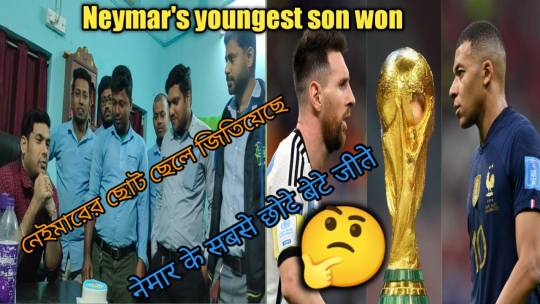
YOU CAN WATCH MANY VERITY FISH FARMS,YOU CAN WATCH VIDEO VERITY FISH DISEASE TREATMENT,YOU CAN WATCH VERITY DOG MARKET PRICE & VERITY BIRD PRICE & AVAILABILITY, FISH & BIRDS & SUPER WORM BREED & SALE DETAILS & ETC, Read More
#shyamaquatic#world cup highlights#match highlights#highlights#world cup#qatar 2022#world cup highlights 2022#fifa world cup highlights 2022#mondiali qatar 2022 highlights#world cup football highlights 2022#fifa world cup qatar 2022#fifa world cup qatar#world cup qatar 2022#world cup 2022#fifa world cup 2022 today match#2018 fifa world cup russia#france vs england world cup 2022#fifa world cup#fifa match highlights#football highlights#fifa world cup highlights
0 notes
Text
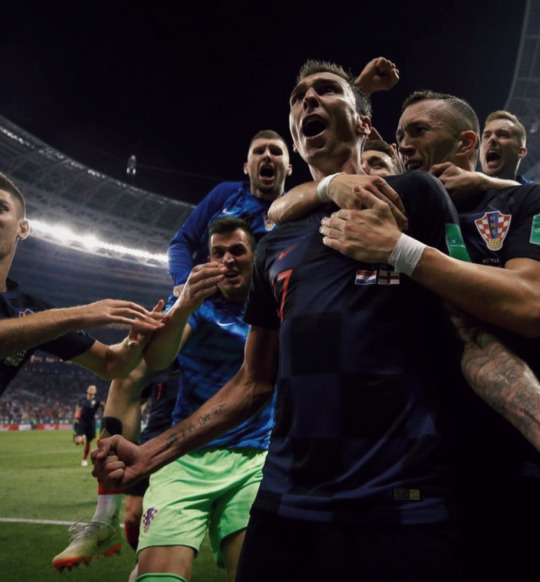
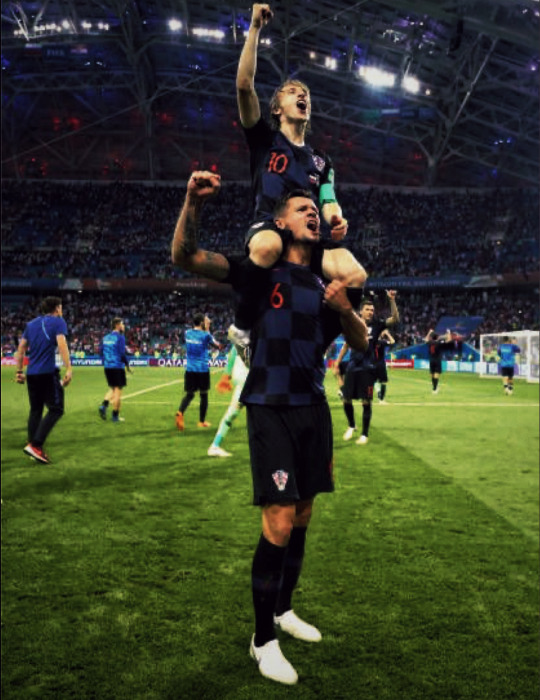
croatia, 2018
7 notes
·
View notes
Text
On This Day, or, Cyka Blyat
Don’t turn off your TV set. Keep watching the “most exciting World Cup ever.” While you do that, actual Russians and some non-Russians (i.e., Oleg Sentsov) are suffering horribly for the near-absolute power Russia’s Emperor of Ice Cream and his retinue have acquired over the last twenty years.
It was this same power (and the money that comes with it) that made it possible for the Emperor of Ice…

View On WordPress
#2018 FIFA World Cup#2018 World Cup#cyka blyat#homophobic violence in Russia#LGBT pride#Oleg Sentsov#Penza-Petersburg "terrorism" case#Russian anti-gay laws#Russian police state#Sergey Chernov#Yuri Dmitriev
0 notes
Text
Germany cancels World Cup event after Russia, Belarus readmitted | CNN
Reuters
—
Germany’s fencing federation has canceled a women’s foil World Cup event after the sport’s global governing body (FIE) reversed a ban on athletes from Russia and its ally Belarus, it said on Thursday.
Athletes from the two countries were banned from many international competitions after Russia invaded Ukraine last February in what Moscow calls a “special military operation.”
More…
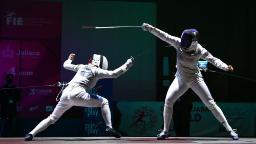
View On WordPress
#2018 fifa world cup#2022 fifa world cup#belarus#continents and regions#eastern europe#europe#fencing#fifa#fifa world cup#football (soccer)#germany#iab-soccer#iab-sports#russia#soccer events#sports and recreation#sports events#sports organizations and teams#western europe
0 notes
Photo

#fifa world cup#dance#football#dancing#soccer#mood#team#awesome#happy dance#fifa#world cup#moving#moves#friday feeling#allez#senegal#russia 2018#synchronisation#senegal dance#team moves#senegal dancing
1 note
·
View note
Text









Britney Griner has been singled out and sentenced to 9 years of hard labor, for accidentally bringing medicinal cannabis onto a domestic flight into Russia.
Griner will serve her sentence in a “General Regime Prison,” which is considered the harshest category of penal colonies for women.
Let’s not forget that 1) as recently as 2019, after serving two months, Russia released a white woman, Audrey Lorber, who intentionally brought significantly more cannabis into Russia than Griner did. 2) Russia is every bit as homophobic and racist as America, and 3) in 2018 the Russian government greatly loosened it’s “tough stance” on drugs, in order to bring in FIFA and the World Cup.
#FreeBrittneyGriner
#politics#russia#brittney griner#lgbt#free brittney griner#lgbtq#homophobia#anti blackness#racism#we are bg#fifa#world cup#fifa world cup
329 notes
·
View notes
Text
Best World Cup Official Song
Relevant context and links to songs under the cut:
We Are One (Ole Ola) is a song recorded by Cuban-American rapper Pitbull for the 2014 FIFA World Cup held in Brazil and features guest vocals from American singer Jennifer Lopez and Brazilian singer Claudia Leitte. The artists co-wrote the song with Sia, RedOne, Danny Mercer, Dr. Luke, Cirkut, and Thomas Troelsen.
youtube
Live It Up is a song by the American singer Nicky Jam featuring the American rapper Will Smith and the Kosovo Albanian singer Era Istrefi. It was used as the official song of the 2018 FIFA World Cup held in Russia.
youtube
7 notes
·
View notes
Text






June 8, 2018
One week before the start of the 2018 FIFA World Cup, Vladimir Putin addressed football teams and their fans arriving in Russia.
“Welcome to Russia!
To all football fans and the greatest football teams on the planet – welcome!
Welcome to all who have already arrived in Russia, and to those who are planning to take part in this landmark international event – the FIFA World Cup.
It is with immense joy and a great honour that we receive representatives of the great football family.
We want this event to be a celebration, filled with passion and emotions.
I hope you will have an unforgettable experience – not only watching the matches of your favourite teams and admiring the players’ skills, but also getting to know Russia.
Learning about its identity and culture, its unique history and natural diversity; its hospitable, sincere and friendly people.
We have done our best to ensure that all of our guests – the athletes, the staff and, of course, the fans – feel at home in Russia.
We have opened both our country and our hearts to the world. Welcome to the FIFA World Cup!
Welcome to Russia!”
#putinedit#vladdy daddy#russian president vladimir putin#vladimir vladimirovich putin#handsome#good looking#sexy#my edit#my edits#Президент России Владимир Путин
2 notes
·
View notes
Text
An interview for Ivan before the 2018 FIFA World Cup Russia
It's really special because,more or less, we start together at the national team.
He's a little bit older than me, and he was maybe four or five months before in the national team and we was really young. I was 19 and he maybe 20, 21. We was really like two young guys to play with all the men.
Now of course is different. He's maybe one of the best players in his position. A lot of respect to him not because he's captain, because of his football and also his way to see the games or what he's doing on the pitch.
So all these guys in the national team, we know that he's the man. He gets there first. He works really hard. He's really professional and that's why I'm so happy of all what he's doing in his career.
I'm not happy because he's in Real Madrid, but in the other way really he deserve it, because he want the best for the team.
This first game against Greece was maybe our best game in the last five or six years. Also after a long time with a full stadium. The people was really behind us and we a play really, really high level.
So, it was really... I spoke with Luka on this moment in the dressing room to say, "Wow, why we don't did it before?"
And, yeah, just now to say we want to do it now everything in every game. We have the opportunity to be at the World Cup in Russiaand we have to show to the world that Croatia have a big team.
14 notes
·
View notes
Text
Events 4.27 (after 1970)
1974 – 109 people are killed in a plane crash near Pulkovo Airport.
1976 – Thirty-seven people are killed when American Airlines Flight 625 crashes at Cyril E. King Airport in Saint Thomas, U.S. Virgin Islands.
1978 – John Ehrlichman, a former aide to U.S. President Richard Nixon, is released from the Federal Correctional Institution, Safford, Arizona, after serving 18 months for Watergate-related crimes.
1978 – The Saur Revolution begins in Afghanistan, ending the following morning with the murder of Afghan President Mohammed Daoud Khan and the establishment of the Democratic Republic of Afghanistan.
1978 – Willow Island disaster: In the deadliest construction accident in United States history, 51 construction workers are killed when a cooling tower under construction collapses at the Pleasants Power Station in Willow Island, West Virginia.
1986 – The city of Pripyat and surrounding areas are evacuated due to Chernobyl disaster.
1987 – The U.S. Department of Justice bars Austrian President Kurt Waldheim (and his wife, Elisabeth, who had also been a Nazi) from entering the US, charging that he had aided in the deportations and executions of thousands of Jews and others as a German Army officer during World War II.
1989 – The April 27 demonstrations, student-led protests responding to the April 26 Editorial, during the Tiananmen Square protests of 1989.
1992 – The Federal Republic of Yugoslavia, comprising Serbia and Montenegro, is proclaimed.
1992 – Betty Boothroyd becomes the first woman to be elected Speaker of the British House of Commons in its 700-year history.
1992 – The Russian Federation and 12 other former Soviet republics become members of the International Monetary Fund and the World Bank.
1993 – Most of the Zambia national football team lose their lives in a plane crash off Libreville, Gabon en route to Dakar, Senegal to play a 1994 FIFA World Cup qualifying match against Senegal.
1994 – South African general election: The first democratic general election in South Africa, in which black citizens could vote. The Interim Constitution comes into force.
2005 – Airbus A380 aircraft has its maiden test flight.
2006 – Construction begins on the Freedom Tower (later renamed One World Trade Center) in New York City.
2007 – Estonian authorities remove the Bronze Soldier, a Soviet Red Army war memorial in Tallinn, amid political controversy with Russia.
2007 – Israeli archaeologists discover the tomb of Herod the Great south of Jerusalem.
2011 – The 2011 Super Outbreak devastates parts of the Southeastern United States, especially the states of Alabama, Mississippi, Georgia, and Tennessee. Two hundred five tornadoes touched down on April 27 alone, killing more than 300 and injuring hundreds more.
2012 – At least four explosions hit the Ukrainian city of Dnipropetrovsk with at least 27 people injured.
2018 – The Panmunjom Declaration is signed between North and South Korea, officially declaring their intentions to end the Korean conflict.
2 notes
·
View notes
Note
Why can't south america bid? what rules? what's going on???
currently when a country from a certain federation (like uefa [europe], conmebol [south america], caf [africa]) hosts the world cup, no other country from that federation can host the next two world cups. for example, since qatar hosted in 2022, no member of the asian federation could host 2026 or 2030. or since russia hosted 2018, no uefa member could host 2022 or 2026
so as a result, since north america is hosting 2026 and countries from europe, africa, AND south america are hosting 2030, only countries from asia and oceania will be eligible to bid for 2034. i assume the bids for 2034 will be saudi arabia and australia, who are both (as @elishamanning reminded me) members of the asian federation. no matter which one gets it (cough probably saudi), 2038 will be interesting because then only north america and oceania will be able to bid, and there's not really an obvious country in there who could feasibly host besides the us, canada, or mexico, who are all hosting in 2026 and therefore probably won't want to do it again. tldr expect fifa to change their own rules when it is convenient for them (after 2034 has already been awarded to saudi)
5 notes
·
View notes
Text
AFC Soccer 2021 championship
OFC: New Zealand 🇳🇿 (2018 FIFA World Cup 3rd round qualifying winners) 1 team
AFC: Syria 🇸🇾, China 🇨🇳, Saudi Arabia 🇸🇦, UAE 🇦🇪, Australia 🇦🇺, Jordan 🇯🇴, Qatar 🇶🇦, Iran 🇮🇷, Oman 🇴🇲, Japan 🇯🇵, Thailand 🇹🇭, Iraq 🇮🇶, South Korea 🇰🇷, Uzbekistan 🇺🇿, Lebanon 🇱🇧 (2018 FIFA World Cup 2nd round qualifiers) 15 teams
Hosts: Bulgaria 🇧🇬, Serbia 🇷🇸, Romania 🇷🇴, Greece 🇬🇷
UEFA: Kosovo 🇽🇰, Bulgaria 🇧🇬, Serbia 🇷🇸, Luxembourg 🇱🇺, Northern Ireland ✋️, Belarus 🇧🇾, Republic of Ireland 🇮🇪, Georgia 🇬🇪, Norway 🇳🇴, Romania 🇷🇴, Slovenia 🇸🇮, Iceland 🇮🇸, Albania 🇦🇱, Cyprus 🇨🇾, Greece 🇬🇷, Bosnia-Herzegovina 🇧🇦 (UEFA Euro 2020 qualifiers) 16 teams
AFC Soccer 2016 championship
OFC: New Zealand 🇳🇿 (2014 FIFA World Cup OFC 3rd round qualifying winners)
AFC: Syria 🇸🇾, China 🇨🇳, Saudi Arabia 🇸🇦, UAE 🇦🇪, Australia 🇦🇺, Jordan 🇯🇴, Qatar 🇶🇦, Iran 🇮🇷, Oman 🇴🇲, Japan 🇯🇵 (Co-Hosts), Thailand 🇹🇭, Iraq 🇮🇶, South Korea 🇰🇷 (Co-Hosts), Uzbekistan 🇺🇿, North Korea 🇰🇵 (2018 FIFA World Cup 2nd round qualifiers) 15 teams
UEFA: Bosnia-Herzegovina 🇧🇦, Slovenia 🇸🇮, Norway 🇳🇴, Denmark 🇩🇰, Scotland 🏴, Netherlands 🇳🇱, Finland 🇫🇮, Bulgaria 🇧🇬, Montenegro 🇲🇪, Estonia 🇪🇪, Serbia 🇷🇸, Belarus 🇧🇾, Cyprus 🇨🇾, Lithuania 🇱🇹, Georgia 🇬🇪, Armenia 🇦🇲 (UEFA Euro 2016 qualifiers)
AFC Soccer 2012 championship
UEFA: Turkey 🇹🇷, Bosnia-Herzegovina 🇧🇦, Montenegro 🇲🇪, Estonia 🇪🇪, Norway 🇳🇴, Hungary 🇭🇺, Armenia 🇦🇲, Switzerland 🇨🇭, Scotland 🏴, Serbia 🇷🇸, Romania 🇷🇴, Belgium 🇧🇪, Belarus 🇧🇾, Slovakia 🇸🇰, Slovenia 🇸🇮, Wales 🏴 (UEFA Euro 2012 qualifiers) 16 teams
OFC: New Zealand 🇳🇿 (2010 FIFA World Cup qualifying play-off winner)
CONCACAF: USA 🇺🇸, Mexico 🇲🇽 (Co-Hosts)
AFC: Iraq 🇮🇶, South Korea 🇰🇷, Uzbekistan 🇺🇿, Australia 🇦🇺, Iran 🇮🇷, Jordan 🇯🇴, Japan 🇯🇵, Qatar 🇶🇦, Lebanon 🇱🇧, Oman 🇴🇲, China 🇨🇳, Kuwait 🇰🇼, Saudi Arabia 🇸🇦 (2014 FIFA World Cup 3rd round qualifiers) 13 teams
AFC Soccer 2009
UEFA: Bulgaria 🇧🇬, Scotland 🏴, England 🏴, Norway 🇳🇴, Serbia 🇷🇸, Finland 🇫🇮, Republic of Ireland 🇮🇪, Northern Ireland ✋️ (UEFA Euro 2008 qualifying) 8 teams
AFC: Japan 🇯🇵, South Korea 🇰🇷, Uzbekistan 🇺🇿, Saudi Arabia 🇸🇦, Iran 🇮🇷, Australia 🇦🇺 (Hosts), North Korea 🇰🇵, Bahrain 🇧🇭 (2010 FIFA World Cup 3rd round qualifying) 8 teams
UEFA-AFC Soccer 2005
UEFA: Turkey 🇹🇷 (Hosts), Scotland 🏴, Slovenia 🇸🇮, Norway 🇳🇴, Wales 🏴, Serbia & Montenegro 🇷🇸, Belgium 🇧🇪, Ukraine 🇺🇦 (UEFA Euro 2004 qualifying) 8 teams
OFC: Australia 🇦🇺, New Zealand 🇳🇿 (invited)
AFC: Saudi Arabia 🇸🇦, Uzbekistan 🇺🇿, Iran 🇮🇷, Kuwait 🇰🇼, Bahrain 🇧🇭, South Korea 🇰🇷 (2006 FIFA World Cup qualifying 2nd round) 6 teams
UEFA-AFC Soccer 2001
UEFA: Scotland 🏴, Ukraine 🇺🇦, Republic of Ireland 🇮🇪, Croatia 🇭🇷, Russia 🇷🇺 (Hosts), Switzerland 🇨🇭 (UEFA Euro 2000 qualifiers) 6 teams
OFC: New Zealand 🇳🇿 (2000 OFC Nations Cup runners-up)
AFC: China 🇨🇳, Saudi Arabia 🇸🇦, Iran 🇮🇷, Oman 🇴🇲, Thailand 🇹🇭, Qatar 🇶🇦, Bahrain 🇧🇭, Iraq 🇮🇶, Uzbekistan 🇺🇿 (2002 FIFA World Cup qualifying 1st round) 9 teams
UEFA-AFC Soccer 1997
AFC: Syria 🇸🇾, China 🇨🇳 (Hosts), Kuwait 🇰🇼, South Korea 🇰🇷, Uzbekistan 🇺🇿, Iran 🇮🇷, Iraq 🇮🇶, Japan 🇯🇵 (1996 Asian Cup) 8 teams
OFC: New Zealand 🇳🇿 (invited)
UEFA: Norway 🇳🇴, Greece 🇬🇷, Republic of Ireland 🇮🇪, Northern Ireland ✋️, Lithuania 🇱🇹, Sweden 🇸🇪, Belgium 🇧🇪 (UEFA Euro 1996 qualifying) 7 teams
UEFA-AFC Soccer 1993
AFC: Japan 🇯🇵, Saudi Arabia 🇸🇦, Qatar 🇶🇦, UAE 🇦🇪, Iran 🇮🇷, North Korea 🇰🇵, China 🇨🇳, Thailand 🇹🇭 (1992 AFC Asian Cup)
CONCACAF: USA 🇺🇸 (Hosts)
OFC: Australia 🇦🇺 (1991 Trans Tasman Cup winner)
UEFA: RCS (Czech & Slovaks) 🇨🇿, Switzerland 🇨🇭, Italy 🇮🇹, Wales 🏴, Portugal 🇵🇹, Rep of Ireland 🇮🇪 (UEFA Euro 1992 qualifiers)
UEFA-AFC Soccer 1989
AFC: South Korea 🇰🇷, Iran 🇮🇷, Qatar 🇶🇦, Saudi Arabia 🇸🇦, China 🇨🇳, Syria 🇸🇾, Kuwait 🇰🇼 (1988 AFC Asian Cup)
UEFA: Italy 🇮🇹 (Hosts)
OFC: Australia 🇦🇺 (1988 Trans Tasman Cup winner)
UEFA: Romania 🇷🇴, Sweden 🇸🇪, East Germany 🚩, Yugoslavia 🏳, Greece 🇬🇷, Czechoslovakia 🇨🇿, Bulgaria 🇧🇬 (UEFA Euro 1988 qualifying)
UEFA-AFC Soccer 1985
UEFA: Switzerland 🇨🇭, Soviet Union 🚩, England 🏴, Wales 🏴, Sweden 🇸🇪, Northern Ireland ✋️, Netherlands 🇳🇱 (UEFA Euro 1984 qualifying) 7 teams
CONCACAF: Mexico 🇲🇽 (Hosts)
OFC: New Zealand 🇳🇿 (1983 Trans Tasman Cup winners)
AFC: Saudi Arabia 🇸🇦, Kuwait 🇰🇼, Qatar 🇶🇦, China 🇨🇳, UAE 🇦🇪, Iran 🇮🇷, Singapore 🇸🇬 (1984 AFC Asian Cup) 7 teams
UEFA-AFC Soccer 1981
UEFA: Northern Ireland ✋️, Austria 🇦🇹, Yugoslavia🏳, Poland 🇵🇱, France 🇫🇷, Hungary 🇭🇺, Turkey 🇹🇷 (UEFA Euro 1980 qualifying) 7 teams
Hosts: Soviet Union 🚩
OFC: Australia 🇦🇺 (1980 Oceania Cup winners)
AFC: Iran 🇮🇷, North Korea 🇰🇵, Syria 🇸🇾, China 🇨🇳, Malaysia 🇲🇾, Kuwait 🇰🇼, South Korea 🇰🇷 (1980 AFC Asian Cup) 7 teams
UEFA-AFC Soccer 1977
AFC: Iran 🇮🇷 (Hosts), Kuwait 🇰🇼, China 🇨🇳, Iraq 🇮🇶 (1976 AFC Asian Cup semi-finals)
CONCACAF: USA 🇺🇸, Mexico 🇲🇽, Haiti 🇭🇹 (invited)
OFC: Australia 🇦🇺 (invited)
UEFA: Wales 🏴, Soviet Union 🚩, Spain 🇪🇸, Belgium 🇧🇪 (UEFA Euro 1976 quarter-finals)
Soccer 1973
Hosts: USA 🇺🇸
CONCACAF: Mexico 🇲🇽, Canada 🇨🇦, Haiti 🇭🇹, Costa Rica 🇨🇷, Cuba 🇨🇺
AFC: Iran 🇮🇷, Thailand 🇹🇭, Iraq 🇮🇶, South Korea 🇰🇷, Kuwait 🇰🇼, Khmer Republic 🇰🇭
CONMEBOL: Brazil 🇧🇷, Argentina 🇦🇷, Peru 🇵🇪, Uruguay 🇺🇾
Soccer 1969
Hosts: Spain 🇪🇸 & France 🇫🇷
UEFA: Bulgaria 🇧🇬 & Hungary 🇭🇺
CONCACAF: Guatemala 🇬🇹, Mexico 🇲🇽, Honduras 🇭🇳, Trinidad & Tobago 🇹🇹
AFC: Iran 🇮🇷, Burma 🇲🇲, Israel 🇮🇱, Rep of China (Taiwan) 🇹🇼
CONMEBOL: Uruguay 🇺🇾, Argentina 🇦🇷, Chile 🇨🇱, Paraguay 🇵🇾
2 notes
·
View notes
Text
USA 1 - 0 Qatar
July 2010 - same-sex marriage is legalised in Argentina.
December 2010 - Russia and Qatar drawn as the hosts of the FIFA World Cups 2018 and 2022.
May 2013 - same-sex marriage is legalised in Brazil.
March 2014 - same-sex marriage is legalised in England and Wales.
June 2015 - same-sex marriage is legalised in all fifty states of America.
Winter 2022 - same-sex marriage is illegal in Qatar.
Seven of the top nations in Europe made their stand against Qatar's laws of same-sex marriages. The Netherlands, England, Germany, Belgium, Wales, Switzerland and Denmark intended to wear the One Love captaincy armbands to show their support for same-sex marriages in the host country. But their show of succour was soon showered on by the threat of punishment in the upcoming group stage games. "A spark of rebellion is all it takes."
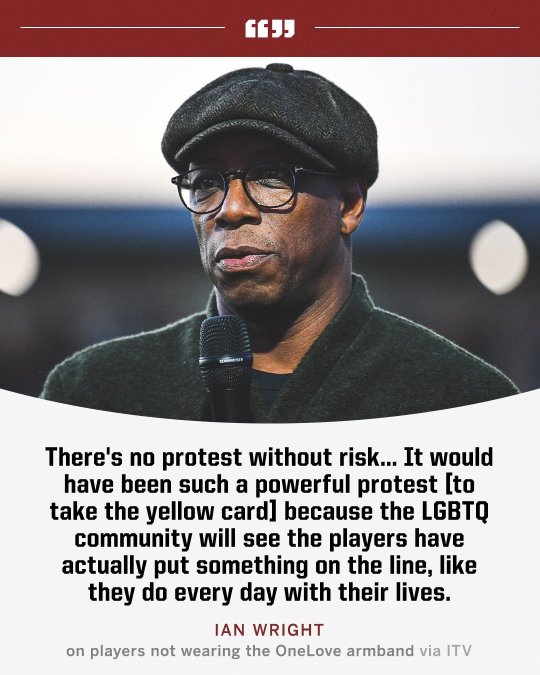
FIFA, however, do encourage the use of different armbands to spread positive social messages for football fans across the World.
Ex-England footballer and sports commentator, Alex Scott, showed her support to the LGBTQ+ community by wearing the One Love armband in the England vs Iran pre-match coverage. The pundit quotes "we're talking about migrant workers, we're talking about the LGBT+ community, we're talking about women's rights."
The US national team took a different approach to show their support for the LGBTQ community. The soccer team used the rainbow logo as part of their “Be The Change” initiative that the team adopted in 2020 with the goal of inspiring action on social justice issues.
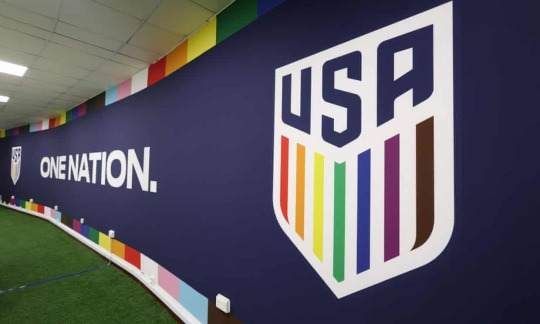
With the United States being co-hosts of the 2026 World Cup, who knows what could happen?
7 notes
·
View notes
Note
What are your thoughts on the World Cup discourse?
there's no ethical way to consume football. like i'm not going to come here and say how bad qatar is and pretend i didn't willingly watch russia 2018, brazil 2014 and south africa 2010 or some matches uefa has organised in the dodgiest places in the world. this sport is inherently fucked up at all angles. if you want to watch, watch, if you don’t then don’t. fifa will make money anyway and so will every team participating.
8 notes
·
View notes
Text
Meduza's The Beet: Kaliningrad: An imperial gem and a thorn in everyone’s side
Hello, and welcome back to The Beet!
Eilish Hart here, the editor of this special dispatch from Meduza covering developments across Eurasia. If someone forwarded you this newsletter, you can sign up here to receive a fresh edition every Thursday. Some of our stories, like last week’s report about Kyrgyzstan and Uzbekistan’s contentious border deal, are available on Meduza’s website, but others are exclusive to subscribers — the more the merrier!
Last September, Vladimir Putin kicked off the school year more than a thousand kilometers from Moscow — in Russia’s western exclave of Kaliningrad. After addressing an audience of star pupils, Putin opened the floor for questions, and a teenage girl immediately confronted him with her concerns about the future. “What plans does Russia have for the development of biotechnology and bioengineering,” the 17-year-old asked, “under the present circumstances, when we’ve been cut off from so many foreign technologies?” Skirting the topic of international sanctions and the brutal war that triggered them, Putin gave an evasive reply: “Regarding the issue of someone cutting someone off from something, that’s really hard to do in the modern world. [...] Can you imagine it? It’s practically impossible.”
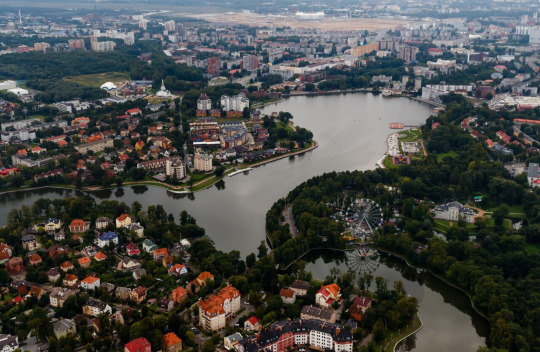
A birds-eye view of Kaliningrad, Russia. August 2017.
LARS BARON / GETTY IMAGES
Ironically, Putin was visiting a corner of Russia where the effects of being “cut off” are felt in more ways than one. Bordering Poland, Lithuania, and the Baltic Sea, the Kaliningrad region has no land links to the rest of the Russian Federation. And prior to World War II, it wasn’t part of Russia at all. The territory changed hands as a result of the Allied victory, passing from Adolf Hitler’s defeated Germany to Joseph Stalin’s USSR. The Soviet authorities stripped the region of its German population and heritage, changing the name of its capital from Königsberg to Kaliningrad and turning a centuries-old port city into a restricted military zone. Since 1991, Kaliningrad has become even more isolated, geopolitically speaking, as its neighbors joined NATO and the European Union. But local residents enjoyed the perks of proximity to E.U. countries and, in recent memory, even saw their city open its doors to the world during the FIFA World Cup in 2018. Just a few short years later, however, the fallout from Russia’s full-scale invasion of Ukraine has left Kaliningrad and its residents “cut off” from Europe once again. Journalist Sergey Faldin reports for The Beet.
Kaliningrad: An imperial gem and a thorn in everyone’s side
By Sergey Faldin
In August 1944, British air attacks demolished most of the East Prussian city of Königsberg — literally “King’s Hill.” The next year, the German region became the first the Red Army entered on the Eastern Front of World War II, as it secured essential ports along the Baltic coast on its way to victory in Berlin.
After four years of incessant fighting, starvation, and death, the Red Army saw the territory as a valuable “war trophy”; mass killings and atrocities against German civilians ensued. “The [Red Army] soldiers had all experienced the horrors of the German invasion. Nearly everyone in the Soviet Union had a family member or a friend who had died in the war,” Nicole Eaton, an Associate Professor of History at Boston College, told The Beet. “Everyone had gone hungry and had their lives torn apart by the German invaders. East Prussia, as the first German territory the Soviets entered, became a site of vengeance for them.”
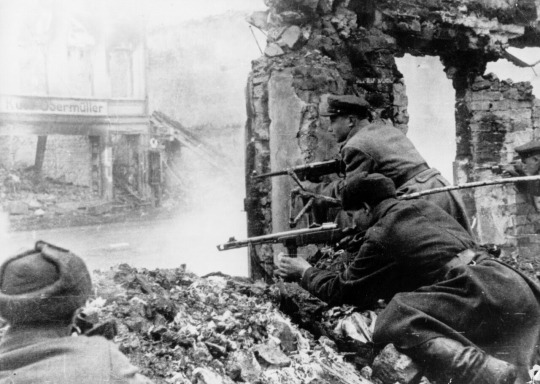
Soviet troops fighting in the Königsberg suburbs in 1945. The officer in the background is firing a German submachine gun.
SLAVA KATAMIDZE COLLECTION / GETTY IMAGES
Having occupied the region, the Red Army stayed. At the 1945 Potsdam Conference, the Allies carved up East Prussia, leaving Königsberg and much of its surrounding territory under Moscow’s control. In 1946, Königsberg became Kaliningrad, renamed after the Bolshevik revolutionary Mikhail Kalinin. The city would go on to become a Soviet military outpost with access to the Baltic Sea, a strategic point of control in Europe. Thus, as Eatonwrites in her book German Blood, Slavic Soil, “Königsberg / Kaliningrad”became “the only city ruled by both Hitler and Stalin as their domain. Not only in wartime occupation but also as an integral part of their empires.”
More than half of Königsberg’s population of about 375,000 was either killed or displaced during the war. In its aftermath, the Soviet authorities initially prevented the region’s remaining Germans from leaving, only to deport them en masse in 1947–1948. “The region is unique in one aspect,” said historian Tomasz Kamusella, a Reader at the University of St Andrews, “which is that the history of its people dates back only to 1945.”
Indeed, by 1946, the Soviet program for “resettling” the Kaliningrad region had already started to gather speed, drawing settlers from across the Russian FSFR and, to a lesser extent, from Belarus and Ukraine. Having suffered through Nazi occupation and the destruction of their hometowns, many were ready to take the leap into new Soviet territory and rebuild their lives. By the early 1950s, roughly 400,000 people from across the Soviet Union had moved to Kaliningrad.
When the USSR collapsed in 1991, and the neighboring Baltic countries regained independence, the territory and its residents were cut off from the rest of the newly formed Russian Federation, turning the Kaliningrad region into an exclave, which by the early 2000s would find itself wedged between E.U. and NATO members Lithuania and Poland.
The newfound independence of former Communist states brought about an identity crisis: for the first time in 50 years, people in Kaliningrad could talk openly about what had happened to their city before and after World War II. “Suddenly, a new narrative was formed. Not just, ‘We came to build socialism on the ruins of fascism,’” said Eaton, referring to the Communist Party’s standard credo about Kaliningrad’s postwar construction. “People began thinking and talking about their German heritage in ways they hadn’t been able to before.”
‘Gdańsk is closer than Moscow’
Eaton describes the 1990s and early 2000s as a period of “post-1991 Euro enthusiasm,” when Moscow granted relative freedom to the regions, enabling them to elect their governments without Kremlin interference. But by the mid-2000s, “Putin was re-envisioning Russia’s economic policy and started giving special attention to regions like Vladivostok and Kaliningrad,” Eaton explained. “Moscow poured a lot of money into these regions to make them feel more ‘Russian’ because as cosmopolitan port cities they seemed to be slipping away and forming strong local identities.”
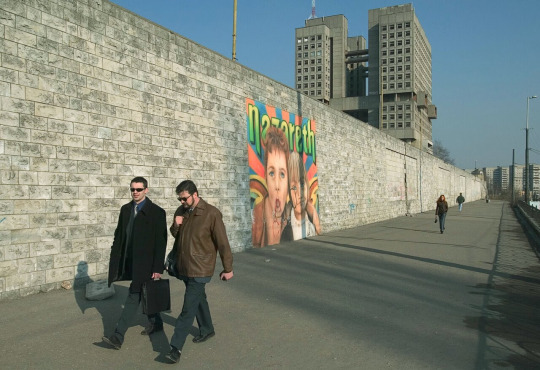
Pedestrians walk along a wall in Kaliningrad. March 2004.
OLEG NIKISHIN / GETTY IMAGES
“After 1991, we suddenly started to question, What is Kaliningrad? Kalinin’s city? But he was a Bolshevik, and we’re not communists anymore,” said Yury, a crisis psychologist from Kaliningrad who now resides in Tbilisi. “Are we Prussians then? But we have no ties to them except the architecture.”
A local border traffic agreement with Poland (which lasted from 2012 to 2016, allowing Kaliningrad residents visa-free travel to nearby Polish provinces for up to 30 days) fostered ties with Europe and helped shape the identity of the people in the region as “Russian Europeans.” Slowly, people began to acknowledge their city’s German past. “In 1995, Kaliningrad marked its 50th year as a [Russian] city; but in the early 2000s it was the 750th anniversary [of its founding],” Kamusella pointed out. “Everything that happened here is our history. Even the history of Prussia and the history of fascism,” a tour guide from Kaliningrad told The Beet.
Kaliningrad’s status as a “special economic zone,” along with its European location and liberal tax policies, turned the region into a lucrative investment opportunity. Some predicted that it would become a “Baltic Hong Kong.” Foreign investors helped fund urban renewal and reconstruction projects, as well as the creation of local history museums, transforming the birthplace of philosopher Immanuel Kant into an emerging tourist destination.
“They are surrounded by Europe; it would be stupid not to trade,” says Maxim Mihutsky, an IT entrepreneur from Belarus residing in the Polish city of Gdańsk, some 100 kilometers (62 miles) from Kaliningrad. Indeed, many Kaliningrad residents used their proximity to Europe to start small businesses selling E.U. goods, shaping the region’s reputation as entrepreneurial. “Everyone has a side hustle; that’s just who we are,” said Petya, a tourism student in Kaliningrad (whose name has been changed for safety reasons). Others relished living the cross-border dream: the largest IKEA in the region is in Gdańsk, just two hours away. “There’s this Polish shop on the border; it has some of the best pies, cheese, and sausages,” Petya recalled dreamily.
As of 2016, a staggering 82 percent of Kaliningraders had passports for foreign travel (by comparison, just 30 percent of Russians hold a passport in 2023). “I’m proud to be European, I’m proud to be the last part of Russia celebrating the New Year, and I’m proud of my Germanic ‘flavor,’” Sasha, a political activist from Kaliningrad (whose name has also been changed), told The Beet.
‘Not an opposition town’
In 2009–2010, Kaliningrad rattled the Kremlin with massive anti-government protests; Moscow had to dispatch a special envoy to quell the unrest. According to Sasha, who has been an active protester for the past decade, these were the region’s first and last large-scale protests. Some of The Beet’s sources speculated that the heavy military presence in Kaliningrad — the home of Russia’s Baltic Fleet — and an alleged influx of officials who purchased land for cheap could explain the increasingly depoliticized atmosphere in the region.
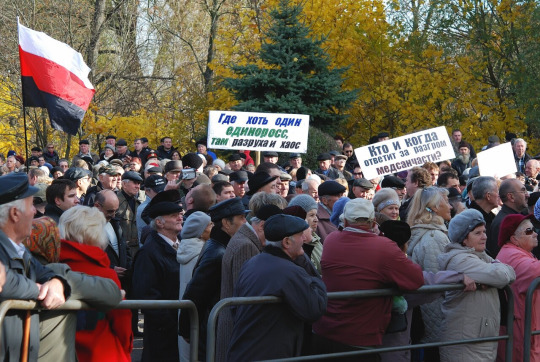
A rally against corruption and abuse of power in Kaliningrad’s Yuzhny Park. October 2010.
GL0CK / SHUTTERSTOCK
Kaliningrad saw a surge in political activity during the 2011–2013 Russian protests (also known as the Bolotnaya or Snow Revolution), but the movement was ultimately suppressed. “First, they canceled the special economic zone; then they stopped trying to turn Kaliningrad into anything other than just another Russian town,” said Yury. “After Bolotnaya, Kaliningrad couldn’t be independent anymore.”
Russia’s illegal annexation of Crimea in 2014 escalated political repressions even further. The ensuing E.U. sanctions, together with the cancellation of the border agreement with Poland in 2016, also made it harder for Russians to travel to Europe.
“My friends and I tried to go out with posters, but it looked pathetic,” recalled Sasha, speaking of the later demonstrations that shook Russia in 2017, after Alexey Navalny’s exposé of then-Prime Minister Dmitry Medvedev’s ill-begotten wealth. “Only ten or twenty people would go out on the streets. Kaliningrad is not and never will be an opposition town.”
After Putin appointed Anton Alikhanov to serve as head of the Kaliningrad region in 2018, the new governor claimed there was no “special Kaliningrad identity,” underscoring that half the population wasn’t even born in the region. “Having a Moscow-appointed governor does mean a greater connection to Moscow,” said Eaton, recalling her own time in Kaliningrad and how locals often spoke of the perceived benefits of a “strong” governor who supposedly had Putin’s ear. “But it’s [about] whose interests are being met – that’s always the question,” she added. When asked about his attitude towards the Moscow-appointed governor, Sasha replied, “He’s a good man, and he’s been doing many things for the region. But I’m sure he steals.”
Sasha was among the few in Kaliningrad who protested Russia’s February 2022 invasion of Ukraine. He recalled some 300 people taking to the city’s streets but said “nobody paid [them] any special attention.”
‘Nobody cares about the war’
After Russia’s illegal annexation of Crimea in 2014, some commentators raised the question of Germany’s historical claim to Kaliningrad. In response, Moscow began sounding the alarm about so-called “Germanization” (or “Westernization”), claiming that Germany (or other NATO countries) want to take back Kaliningrad and make it their own. Foreign Minister Sergey Lavrov reiterated this rhetoric during a visit to Kaliningrad in 2021.
However, these concerns appear to exist solely within the minds of Kremlin politicians. “We Kaliningraders hate it when Muscovites come to our home and talk about Germanization,” said Sasha. “There was no Germanization, neither in the past nor the present. This is Russia, and everyone understands that.”
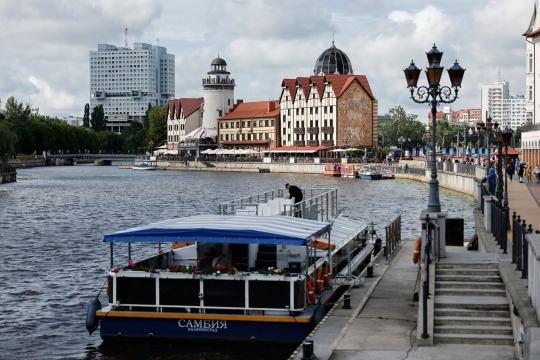
Central Kaliningrad. June 2022.
AP / SCANPIX / LETA
“Today’s Germany doesn’t harbor any projects of imperial conquest like Russia,” underscored Kamusella. “If there were any ideas today in Germany about taking back Kaliningrad they would be quickly silenced, mainly because of Germany’s War World II guilt and the utter impracticality of annexing a discontiguous territory where one million Russian citizens live,” Eaton concurred. “The potential secession from Russia, although a good story to sell by propagandists, is just not practical for anyone.”
In fact, against the backdrop of Russia’s war against Ukraine, Kaliningrad has only grown more isolated from Europe. Ever since Lithuania banned the transportation of E.U.-sanctioned goods to Kaliningrad in mid-2022 (a move Russian officials decried as an “illegal blockade”), Sasha’s father, a long-distance trucker, has been unable to find work. Many E.U. products that were once common in the region are no longer available on store shelves. “[There’s] odd juice boxes and Russian groceries I’ve never heard of instead of Lithuanian ones,” Sasha lamented.
Others, like Petya, do not connect these developments to the ongoing war. “When the special military operation [sic] began, my friends called me, worried,” he told The Beet, using the Kremlin’s official term for the 2022 invasion. “I was surprised: for us, nothing changed. We were, and still are, Russia. The war is in Ukraine.”
Nevertheless, the Russian exclave hasn’t been spared the war’s chilling effects. Last March, Russia’s Interior Ministry added two Kaliningrad journalists to its federal wanted list. Local activist Igor Baryshnikov, who criticized the war on social media, faces two criminal charges of spreading “false information” about the Russian military (the 64-year-old’s trial was postponed indefinitely after he was hospitalized in February). One of The Beet’s contacts from Kaliningrad declined to give an interview, citing concerns about being blacklisted as a “foreign agent.”
Last March, Alexey Milovanov, a Kaliningrad journalist and the former editor-in-chief of Novy Kaliningrad, found a sign taped to his apartment building’s front door that read “Zдесь жиVёт предатель”— “A traitor lives here” (with the capitalized Latin letters “Z” and “V” that have become key symbols in the Kremlin’s war propaganda). Milovanov posted a photo of the sign on his Telegram channel, commenting, “Ordinary fascism. Surprised it took them so long.”
Journalists at Mediazona report that some 180 killed soldiers from the Kaliningrad region are among the 18,000 independently confirmed Russian casualties in Ukraine. Recent viral videos showing mobilized troops from Kaliningrad and other regions refusing to fight and being called “cannon fodder” highlight the grim realities Russian draftees face. “We used to have a tradition in Kaliningrad,” Yury, the psychologist, explained, “that anyone who serves in the military [only] serves within the region. Seems that this tradition has been neglected.”
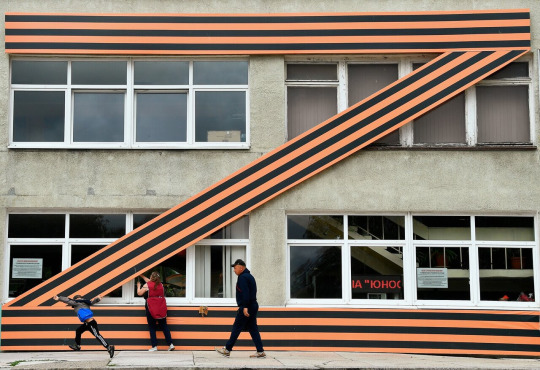
A pro-war “Z” adorns the facade of Kaliningrad’s Yunost Sports Palace. August 2022.
IGOR IVANKO / KOMMERSANT / SIPA USA / VIDA PRESS
Besides the initial sporadic protests and random arrests, Sasha says the atmosphere in Kaliningrad hasn’t changed much since February 24, 2022. “It’s as if nothing is happening,” he told The Beet. “Nobody cares about the war. Even the [lack of] transit [to the E.U.] isn’t affecting the mood. It’s demoralizing.”
Russia’s mobilization drive last September also provoked little backlash in the region. Sasha knows only one person who has been killed in action — “but he was a contract soldier” — and has another colleague who was called up last month and is now in Ukraine. “That one is still alive and texts me occasionally,” he said.
A great asset to an empire
In late 2022, Warsaw announced plans to construct a temporary “wall” along Poland’s border with Kaliningrad, citing concerns about Moscow potentially turning the exclave into an illegal migration route (along the lines of the 2021 E.U. border crisis with Belarus). “It took so long to tear down those walls from a historical perspective,” Kamusellatold The Beet. “Of course, we know why it’s being built, but as a historian, I also know that if erected, those walls will stand.”
“The wall has significant repercussions,” said Eaton. “In many ways, it’s a continuation of a repeating tragedy from the past century. The region, once a polyglot and multiethnic community of German, Polish, and Lithuanian speakers, became Germanized by the Nazis, and then was Russianized by the Soviets. It’s tragic because Kalinigrad’s residents after the Soviet collapse could engage in these great cross-border exchanges and cultural dialogues once again, but now no longer.”
Despite these developments, the consensus appears to be that Kaliningrad remains more of an asset than a liability to the Kremlin.
In 2018, a Russian official confirmed that Moscow had equipped the region with Iskander missiles — nuclear-capable rockets that could potentially reach not only the Baltic countries but also parts of Poland and, in certain circumstances, even Berlin. Experts debate if Kaliningrad is actually capable of launching nuclear attacks or if it’s just another Kremlin bluff. “I would say with 70-percent certainty there are nuclear missiles over there,” Kamusella said. “We all remember the Warsaw Pact and how that turned out.” (During the Cold War, the Soviet Union denied stockpiling nuclear weapons in Communist Poland, only to have their storage sites discovered after the Warsaw Pact dissolved in 1991.)
“As long as Russia and NATO exist, Kaliningrad will be a thorn in NATO’s side and vice versa. I find it difficult to imagine Kaliningrad changing hands unless this war catastrophically escalates globally,” Eaton speculated. “From an imperial perspective, Kaliningrad is a great asset,” added Kamusella. “An exclave surrounded by the enemy? It justifies whatever military measures Russia takes in that region.”
That’s all for now!
For more of Sergey Faldin’s reporting for The Beet, check out his last report on how Russia’s 2022 mobilization impacted the country’s HIV patients. Until next time,
Eilish
3 notes
·
View notes